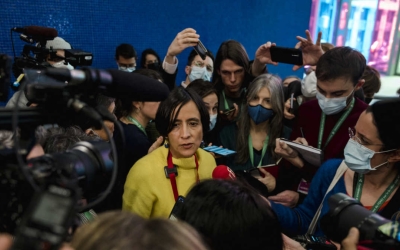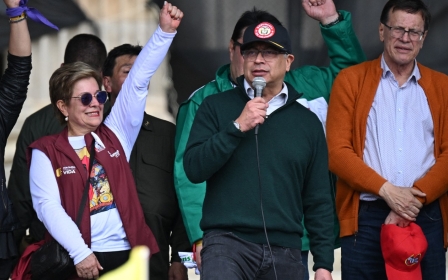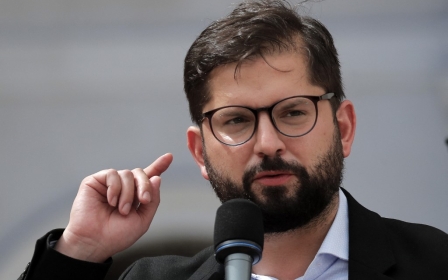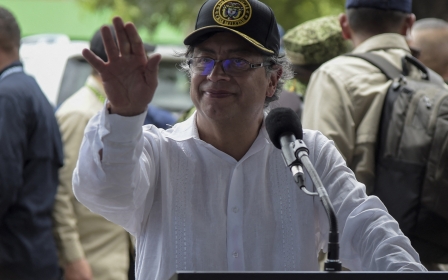Colombia's move to cut ties with Israel could have a regional domino effect

Colombia has become the second South American country to cut relations with Israel over its war on Gaza.
Speaking at a rally on Wednesday in the capital Bogota, Colombian President Gustavo Petro announced that as of 2 May, it would sever ties with Israel, following months of tension between them.
Tomorrow "we will break diplomatic relations with the state of Israel for having a government, for having a president who is genocidal", Petro said to a cheering crowd that had gathered to mark International Workers' Day.
Petro said that Columbia cannot stand by passively and watch a "genocide" and "extermination of an entire people".
“If Palestine dies, humanity dies,” he added.
New MEE newsletter: Jerusalem Dispatch
Sign up to get the latest insights and analysis on Israel-Palestine, alongside Turkey Unpacked and other MEE newsletters
Unsurprising move
Petro has never minced his words when it comes to Israel, as he has publicly displayed a strong pro-Palestinian narrative for the last number of months.
In March he threatened to break ties with Israel if the country didn’t comply with the United Nations’ appeal for a ceasefire.
'Petro has positioned himself as a champion of the downtrodden, the underdog'
- Elizabeth Dickinson, International Crisis Group
The ongoing war in Gaza has featured heavily on Petro’s X profile, arguably the president’s preferred platform to express his opinions.
Since October, Petro's continuous stream of tweets on the subject has stirred controversy, drawing criticism for his perceived lack of diplomatic finesse. He has consistently called for a ceasefire, openly lambasted the Israeli government for its actions – controversially equating the Israeli military to the Nazis – and spoken out against the numerous attacks and violations across Palestine.
“Petro’s announcement that he will break ties with Israel comes after months of tensions and forthright statements, so it is not – in that sense – a surprise.
As a politician, Petro has repeatedly positioned himself as a champion of the downtrodden, the underdog,” Elizabeth Dickinson, a senior analyst for Colombia at the International Crisis Group, told Middle East Eye.
Israel’s Minister of Foreign Affairs, Israel Katz, responded to Petro’s decision on X, calling the Colombian head of state an “anti-semitic president full of hatred”.
‘Moral defeat’ for Israel
Cutting ties with Israel is the strongest action the Colombian president has taken since the outbreak of the war last October.
In late October, Petro recalled Colombia’s ambassador to Israel shortly after announcing the country would open an embassy in Palestine. Honduras and Chile also recalled their ambassadors.
In February, Colombia decided to suspend its purchases of Israeli weapons after an Israeli attack on Palestinians awaiting aid. Then, in early April, the Colombian government made a formal request to join South Africa’s case at the International Court of Justice, accusing Israel of committing genocide.
'It’s going to be more important for Israel than Colombia, as it’s a very tough blow. It’s a moral defeat that isolates Israel even more'
- Mauricio Jaramillo, Universidad del Rosario
A central figure in Petro’s administration, Environment Minister Susana Muhamad, has Palestinian roots and has been a vocal defender of the Palestinian cause during her time in government.
Colombia has traditionally been a “historic ally” of Israel in the region. However, under Petro, the country's first-ever leftist president, Colombia has opted to distance itself from Israel.
“It’s going to be more important for Israel than Colombia, as it’s a very tough blow. It’s a moral defeat that isolates Israel even more,” Mauricio Jaramillo, professor of international relations at the Universidad del Rosario in Bogota, told MEE.
The intricacies of Colombia’s decision to break ties with Israel have yet to be laid out by the Colombian government. Petro’s predecessor, the conservative Ivan Duque, was a close friend of Israel and signed a Free Trade Agreement with the state, something Jaramillo expects will remain intact despite Petro’s decision.
“Colombia won’t want to go beyond a simple rupture that implies the return of the Israeli ambassador,” Jaramillo said, highlighting that the economic impact of cutting ties is likely to be limited, as the two countries don’t have a particularly close commercial relationship.
Colombia’s exports to Israel in 2023 were just under $500m.
Military dependence
Much of the relationship between the countries has historically revolved around defence and security, as the Andean nation has long relied on Israeli military support for its decades-long fight against armed groups and drug trafficking cartels.
Severing ties would end that support, haemorrhaging a central pillar of President Petro’s domestic agenda.
“One of Petro’s headline policies at home, known as ‘total peace’, is a move to seek peace talks with different armed groups. Urging a ceasefire in Gaza, and subsequently this decision [to cut ties], fit his political narrative, and we should read this decision as a matter of his personal conviction and a play toward his political base,” Dickinson explained.
Nonetheless, Palestinian authorities in Colombia welcomed Petro’s decision and said that breaking a reliance on Israeli military intelligence would benefit the country in the long run.
“In the long term, it benefits the country, Colombia or anyone else cannot depend so much on a single country, because one can become tied to the interests of a third party," Alexander Montero, political advisor at the Palestinian embassy in Bogota, told MEE.
"It is a long-term opportunity for Colombia's security and defence to diversify its suppliers and not be at the mercy of the whims of a third party,”
The Israeli embassy in Colombia did not respond to Middle East Eye’s request for comment.
Domino effect?
With Petro’s decision to break ties, Colombia now joins Bolivia and Belize as the only countries in the Americas to sever their relations with Israel over the ongoing war in Gaza. Some analysts believe Petro’s move might encourage others to follow suit.
Experts also warned that Colombia’s decision to sever relations with Israel is likely to have a limited tangible impact on the ongoing Israeli offensive in Gaza. So far, Israeli forces have killed nearly 35,000 people in Palestine.

Brazil and Chile would be the most likely regional contenders to follow suit, as both countries are led by leftists who have also been outwardly critical of Israel’s actions.
Brazilian president Luiz Inacio Lula da Silva was declared persona non grata by the Israeli government in February after comparing Israel’s ongoing onslaught to actions seen during the Holocaust.
His Chilean counterpart, Gabriel Boric, has long been a defender of the Palestinian cause, and has repeatedly spoken out against Israel since the outbreak of the war. Chile is also home to the largest Palestinian diaspora outside of the Arab world, so President Boric faces increased internal pressure to take a tougher stance towards Israel.
Nonetheless, Chile promptly discarded cutting its ties to Israel. Following Petro’s announcement, Chilean Foreign Minister Alberto van Klaveren stated that following suit “is not a measure that is being contemplated” by the Boric government.
“I don't think that it will have a huge political, military or economic impact on Israel,” Yousef Aljamal, an academic and co-author of Palestinian Diaspora Communities in Latin America and Palestinian Statehood, told Middle East Eye.
“[But] it's a significant move that could open the door for other countries, especially in Latin America, to follow suit and cut ties with Israel. I don't think that it will have an impact on Israel's attacks on Gaza, but it will send a message of solidarity to the Palestinian people.”
Middle East Eye delivers independent and unrivalled coverage and analysis of the Middle East, North Africa and beyond. To learn more about republishing this content and the associated fees, please fill out this form. More about MEE can be found here.





